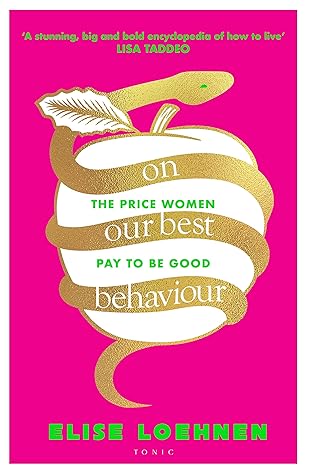More on this book
Community
Kindle Notes & Highlights
Read between
March 16 - March 17, 2024
I was trying to be good. I had always been trying to be good. I ran myself ragged; cared dutifully for my family, friends, and colleagues; punished my body so that it stayed a certain size; kept my temper in check. What would happen if I just . . . stopped?
We all struggle to be known, to express the truest, most tender parts of ourselves, to feel safe enough to bring our gifts to bear. We wonder: Who am I? What do I want and need? How do I find my purpose and serve? Our greatest imperatives are to belong, to love and be loved in return.
Everything we come to be, to know, and to do as human beings we have to learn from other human beings. Indeed, educability is our species’ trait. And that is why to be human is to be in danger, for we can easily be taught many wrong and unsound things.
No one wholly invents themselves.
We don’t want to be perceived as wanting too much, or being too much; we equate “self-control” with worthiness.
Rather than following our instincts, we have been taught to deny them. This denial prevents us from crediting ourselves (pride), pleasuring ourselves (lust), feeding and securing ourselves (gluttony, greed), releasing our emotions and asserting our needs (anger), relaxing (sloth), and desiring . . . really anything at all (envy).
The naturalist E. O. Wilson said about the problem of humanity: “We have Paleolithic emotions, medieval institutions, and god-like technology.”
“Echoists live by the rule: The less room I take up, the better. They are afraid of being a burden. And in our research, what we found is that the core defining feature was a fear of seeming narcissistic in any way.”
For many of the women I know, it feels safer and more secure to be underestimated, overlooked, and not valorized in any way.
Braiding Sweetgrass. One example she gives is the Three Sisters—corn, beans, squash—and why Indigenous communities planted them, not in discrete, manicured, and monocrop rows, but always bundled together. In this way, each plant ensured the other two sisters could get their needs met; together they flourished. The corn provides the scaffolding; the “curious” bean meanders in many different directions but cannot overwhelm the space the corn has marked for herself. The squash provides shade and a microclimate with her big leaves. The soil thrives, ensuring a healthy environment for the next
...more
Recent research about adverse childhood events (ACEs) and obesity is damning: Emotional, physical, and sexual abuse; neglect; mental illness; incarcerated relatives; divorce; and addiction all increase the risk of physical and mental health problems, including obesity.
I don’t know what was more frustrating—that this man did so little or that I felt compelled to do so much.
“The direct expression of anger, especially at men, makes us unladylike, unfeminine, unmaternal, sexually unattractive, or, more recently, ‘strident.’ Even our language condemns such women as ‘shrews,’ ‘witches,’ ‘bitches,’ ‘hags,’ ‘nags,’ ‘man-haters,’ and ‘castrators.’ They are unloving and unlovable. They are devoid of femininity. . . . It is an interesting sidelight that our language—created and codified by men—does not have one unflattering term to describe men who vent their anger at women. Even such epithets as ‘bastard’ and ‘son of a bitch’ do not condemn the man but place the blame on
...more
pleasers, with “type C personality” traits like being “cooperative and appeasing, unassertive, patient, unexpressive of negative emotions (particularly anger) and compliant with external authorities.” In short, unprocessed and sublimated anger is killing us.
While we recognize aggression in its physical and verbal forms, there’s a third type, social aggression, otherwise known as gossip, alliance building, silent treatment, and exclusion.
White women, in particular, self-flagellate, prostrate ourselves, and resign from jobs at any suggestion of wrongness or badness. We turn our venom on each other and lick wounds, rather than confront our feelings, take empathic accountability, or figure out the most effective path forward. In our frustration and fear, we struggle to own our participation in past behavior or even to acknowledge that change is part of the process. We aim for perfection, shuddering at the moments when we’ve said the wrong thing, missed an opportunity, put our foot in our mouth. When this happens, many women
...more
I realized that I could be right, or I could be free.”
I wanted to be over it, to be in peace as fast as possible, because accepting that I wasn’t OK would require acknowledging that I felt hurt.
More pointedly, I was angry because I had crossed my personal boundaries with my professional existence. Or really, I hadn’t set any boundaries at all. I was angry I had spent a vast majority of my waking hours thinking about and attending to work rather than my kids, my marriage, my friends, and that I had deluded myself into believing this level of sacrifice was required or worth it. I was also angry with myself for spending all my energy building something that felt personal but at the end of the day was not mine. The most painful part was that I had wrapped up my value with my job—my
...more
“The fortunate man is seldom satisfied with the fact of being fortunate. Beyond this, he needs to know that he has a right to his good fortune. He wants to be convinced that he deserves it and above all, that he deserves it in comparison with others. Good fortune thus wants to be legitimate fortune.”
Or my favorite, “Foolish Wisdom,” cautions us not to focus on fixing other people when we have plenty to refine within ourselves; this feels so much more powerful than a chastisement to never take pride in our accomplishments.


